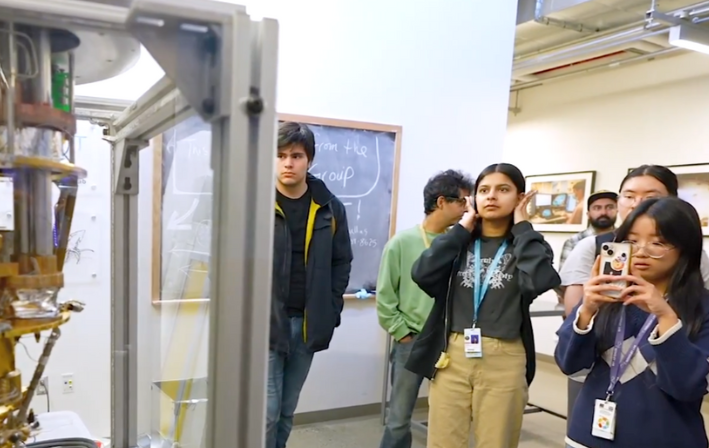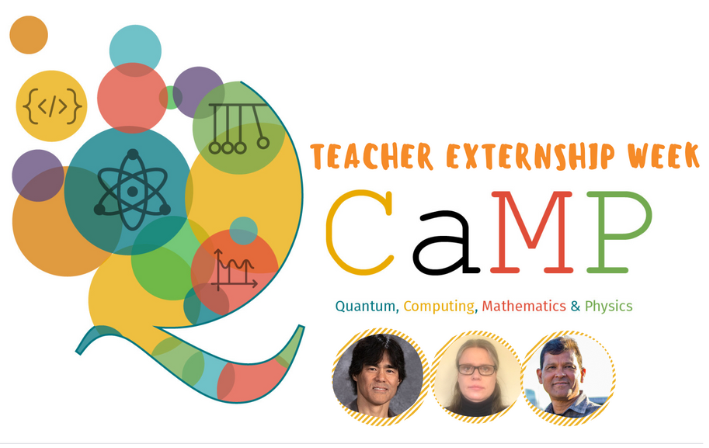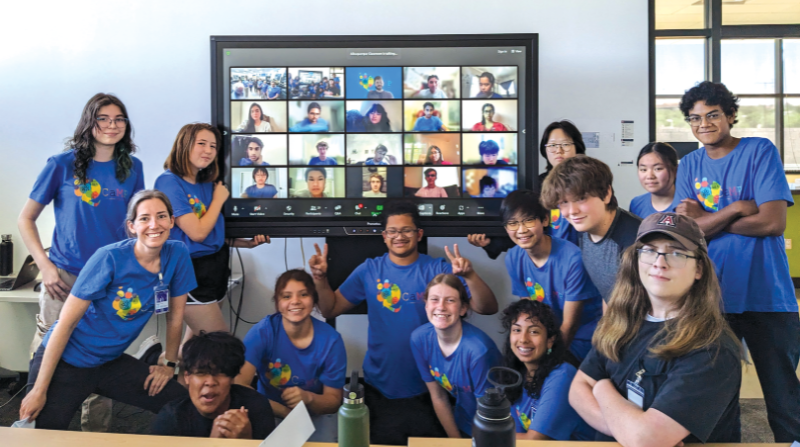Quantum information science (QIS) is a rapidly evolving interdisciplinary field requiring a workforce prepared to meet the scientific challenges in the future. The Quantum Systems Accelerator (QSA) has been committed to developing novel educational pathways that grow the nation’s STEM (science, technology, engineering, and math) workforce.
The Quantum Computing, Mathematics, and Physics summer camp (QCaMP) has been QSA’s innovative yearly educational program since 2022 for high school students and teachers in STEM from New Mexico and California. Under the 2023 DOE Office of Science’s Reaching a New Energy Sciences Workforce (RENEW) initiative, the Office of Workforce Development for Teachers and Scientists (WDTS) recently awarded $573,000 for the expansion of QcaMP, Building New Pathways for a Quantum Ready Workforce.
Expanding Efforts for a Broader Reach
Co-founded by Sandia National Labs (Sandia Labs) and Lawrence Berkeley National Laboratory (Berkeley Lab), QCaMP continues to grow and expand. More than 70 students and 36 teachers have participated in QCaMP. Thanks to the 2023 WDTS RENEW award, the 2024 QCaMP will be expanded to a comprehensive four-week Pathway Summer School for New Mexico and California students. The lessons will go beyond quantum computing, mathematics, and physics and include quantum communications and sensing, which have documented rapid technological breakthroughs over the past years. Both labs will also host the students on-site, allowing many to meet and greet scientists and experience the most modern tools and instrumentation in national research facilities.

“The RENEW award is an investment into our future workforce and an effort to remove historical barriers to participation in STEM fields. By focusing on a rapidly changing STEM field, we’re providing a rare opportunity for young people to be included in an area that is changing the way we think about computing, materials, and energy,” said Faith Dukes, the director of K-12 Programs at Berkeley Lab.
Impacting Lives, Inspiring Careers
Since its founding in 2022, QCaMP has sought to make QIS education broadly accessible. An interdisciplinary team of experts has carefully designed lessons so anyone can learn without course prerequisites in computer science, math, and physics fundamentals. The teachers’ concepts and lesson materials have also been improved yearly to support their curricula. By empowering educators with the latest tools and knowledge to introduce QIS topics to their classrooms, QCaMP’s impact has been broader.

QCaMP’s modules also include active learning so students can apply their knowledge in collaborative research projects with real quantum processors. One of these student projects earned numerous regional, national, and international awards in 2021, allowing the student to gain the visibility and recognition to earn a coveted spot in a top undergraduate QIS program.
“Two of the most impactful outcomes of QCaMP have been sparking further curiosity by students into more complicated concepts in quantum information science and creating open channels of communications and mentorship between expert researchers and prospective students that otherwise wouldn’t have developed,” explained Sandia Labs’ Megan Ivory, who serves as QSA’s technical lead for QCaMP.
“My favorite part of QCaMP was being able to learn about the quantum world from passionate mentors. Now, I am inspired by how diverse the quantum field is and want to learn more about the potential impacts quantum computing could have on AI and optimization,” said 2022 QCaMP alumni Zena Wu
Several partners and sponsors from industry, national labs, and academia have joined efforts to support QCaMP. The QCaMP leadership team recently published a detailed curriculum analysis and results with a breakdown of methods and concepts introduced. The IEEE Quantum Science and Engineering Education Conference (QSEEC) selected it as the Best Paper.
“We’re very excited to be able to continue generating excitement about QIS and technology amongst new students, teachers, and communities! We also look forward to engaging our researchers further, introducing our national labs’ capabilities and facilities, and finding ways to create sustainable educational pathways,” said Jake Douglass, QSA’s workforce development lead.
To receive information on the 2024 Student QCaMP, complete this contact form.
Founded in 1931 on the belief that the biggest scientific challenges are best addressed by teams, Lawrence Berkeley National Laboratory and its scientists have been recognized with 16 Nobel Prizes. Today, Berkeley Lab researchers develop sustainable energy and environmental solutions, create useful new materials, advance the frontiers of computing, and probe the mysteries of life, matter, and the universe. Scientists from around the world rely on the Lab’s facilities for their own discovery science. Berkeley Lab is a multiprogram national laboratory, managed by the University of California for the U.S. Department of Energy’s Office of Science. DOE’s Office of Science is the single largest supporter of basic research in the physical sciences in the United States, and is working to address some of the most pressing challenges of our time. For more information, please visit energy.gov/science.
Sandia National Laboratories is a multimission laboratory operated by National Technology and Engineering Solutions of Sandia LLC, a wholly owned subsidiary of Honeywell International Inc., for the U.S. Department of Energy’s National Nuclear Security Administration. Sandia Labs has major research and development responsibilities in nuclear deterrence, global security, defense, energy technologies and economic competitiveness, with main facilities in Albuquerque, New Mexico, and Livermore, California.
The Quantum Systems Accelerator (QSA) is one of the five National Quantum Information Science Research Centers funded by the U.S. Department of Energy Office of Science. Led by Lawrence Berkeley National Laboratory (Berkeley Lab) and with Sandia National Laboratories as lead partner, QSA will catalyze national leadership in quantum information science to co-design the algorithms, quantum devices, and engineering solutions needed to deliver certified quantum advantage in scientific applications. QSA brings together dozens of scientists who are pioneers of many of today’s unique quantum engineering and fabrication capabilities. In addition to industry and academic partners across the world, 15 institutions are part of QSA: Lawrence Berkeley National Laboratory, Sandia National Laboratories, University of Colorado at Boulder, MIT Lincoln Laboratory, Caltech, Duke University, Harvard University, Massachusetts Institute of Technology, Tufts University, UC Berkeley, University of Maryland, University of New Mexico, University of Southern California, UT Austin, and Canada’s Université de Sherbrooke. For more information, please visit https://quantumsystemsaccelerator.org/
